
Have you ever experienced toothache, bleeding gums, or bad breath? These are all common dental problems that can cause discomfort and embarrassment. But did you know that most of these issues can be prevented with proper oral hygiene and regular dental check-ups?
Dental problems are a widespread issue that affects people of all ages. Poor oral hygiene, an unhealthy diet, and smoking are some of the leading causes of dental problems. Ignoring these issues can lead to serious consequences, such as tooth loss, gum disease, and even systemic health problems.
Prevention is the key to maintaining good dental health. With the right information and habits, you can avoid most dental problems and maintain a healthy smile. In this article, we will discuss some of the most common dental problems and how to prevent them. Read on to learn how you can keep your teeth and gums healthy and avoid unnecessary pain and discomfort.
Maintaining good dental health is important to avoid common dental problems such as tooth decay, gum disease, and sensitivity. It is crucial to visit the dentist regularly for checkups and cleanings to prevent these issues.
Brushing and flossing twice a day and following a balanced diet can aid in preventing dental problems. However, if you do experience discomfort or pain related to your teeth, it is essential to schedule an appointment with your dentist to explore treatment options and avoid any complications.
Tooth decay is a common dental problem that arises when bacteria present in the mouth break down the sugars we consume, producing acids that erode the enamel of our teeth. If left untreated, it can lead to cavities, tooth loss, and gum disease. However, you can take measures to prevent tooth decay and maintain healthy teeth by following these simple tips:
By following these tips, you can prevent tooth decay and maintain good oral health for years to come.
Gum disease, also known as gingivitis, is a condition that affects the gums and can lead to tooth loss if left untreated. Gum disease is caused by a buildup of plaque on your teeth that develops when you don’t brush and floss regularly. This plaque buildup can result in inflammation of the gums.
One of the first symptoms of gum disease is bleeding gums, which is often noticed when brushing your teeth. Other signs include swollen, tender, or receding gums, persistent bad breath, and loose teeth.
Here are some tips to prevent gum disease:
 Brush and floss regularly: Brush your teeth twice a day for at least two minutes and floss once a day to remove any food particles that may be stuck between your teeth.
Brush and floss regularly: Brush your teeth twice a day for at least two minutes and floss once a day to remove any food particles that may be stuck between your teeth.If you are already experiencing gum disease, your dentist may recommend scaling and root planing, a deep cleaning procedure that removes tartar buildup from below the gum line. In more severe cases, surgery may be required.
If you are already experiencing gum disease, your dentist may recommend scaling and root planing, a deep cleaning procedure that removes tartar buildup from below the gum line. In more severe cases, surgery may be required.
Tooth sensitivity is a common dental problem that most people experience at some point in their lives. Tooth sensitivity can cause mild to severe discomfort, and can greatly affect your quality of life.
Tooth sensitivity is caused by the exposure of the dentin layer, which is the layer beneath the enamel that contains tiny tubules. The nerve endings in the tubules are stimulated by hot or cold temperatures, or acidic foods and drinks, causing pain or discomfort. Here are the following causes of tooth sensitivity:
Preventing tooth sensitivity starts with good dental hygiene. Here are some tips to prevent tooth sensitivity:
Bad breath can be a real social problem. It can lead to embarrassment and make others avoid you. Many people suffer from bad breath, and the good news is that it is often easy to prevent.
Bad breath is usually caused by bacteria in the mouth that produce sulfur compounds. These bacteria break down food particles and release sulfur compounds, which can smell like rotten eggs or other unpleasant odors. Poor dental hygiene, dry mouth, certain foods and drinks, and health problems such as gum disease, respiratory infections, and diabetes can all contribute to bad breath.
Bad breath is a common problem that can be embarrassing and affect your social life. If you’re concerned about bad breath, talk to your dentist, who can help identify the underlying causes and recommend treatments.
Oral cancer is a serious disease that affects millions of people worldwide. We will discuss the common oral cancer symptoms and how to prevent them.
Oral cancer refers to cancers that occur in the mouth or on the lips. It can affect the tongue, gums, cheeks, the floor of the mouth, and the roof of the mouth. Like all types of cancer, oral cancer is a complex condition that can develop for a variety of reasons.
 The most common symptom of oral cancer is a sore in the mouth that doesn’t heal within two weeks. However, other symptoms include:
The most common symptom of oral cancer is a sore in the mouth that doesn’t heal within two weeks. However, other symptoms include:
As with all types of cancer, prevention is key when it comes to oral cancer. Here are some tips to help you prevent oral cancer:
Dental problems can be quite common, but there are several steps you can take to prevent them. By maintaining good oral hygiene habits such as brushing twice a day, flossing daily, and visiting your dentist regularly, you can reduce your risk of developing tooth decay, gum disease, and other dental problems.
It’s important to address any dental issues as soon as possible to prevent them from becoming more serious. Delaying treatment can lead to more complicated and costly procedures down the line. Therefore, it’s essential to take preventative measures and seek professional help when necessary to keep your teeth and gums healthy.
At Smilebliss, we are committed to helping you achieve optimal dental health. Our team of experienced dental professionals provides a range of services, including routine cleanings, fillings, and cosmetic treatments, to help you maintain a healthy, beautiful smile.
Don’t wait until it’s too late to address dental problems. Contact Smilebliss today to schedule an appointment and take the first step towards a healthier, happier smile.